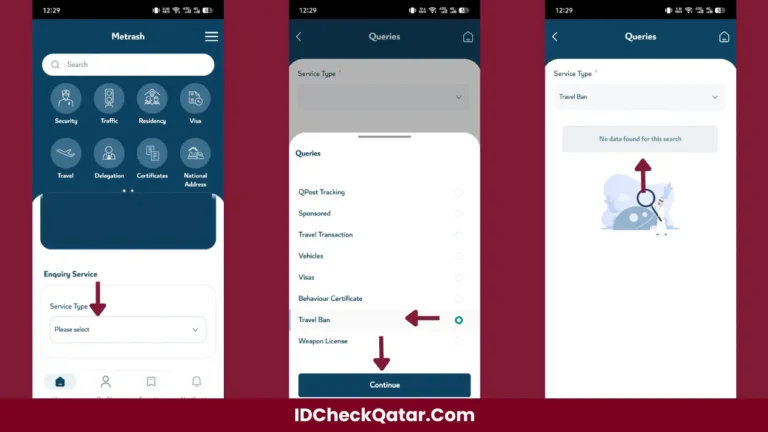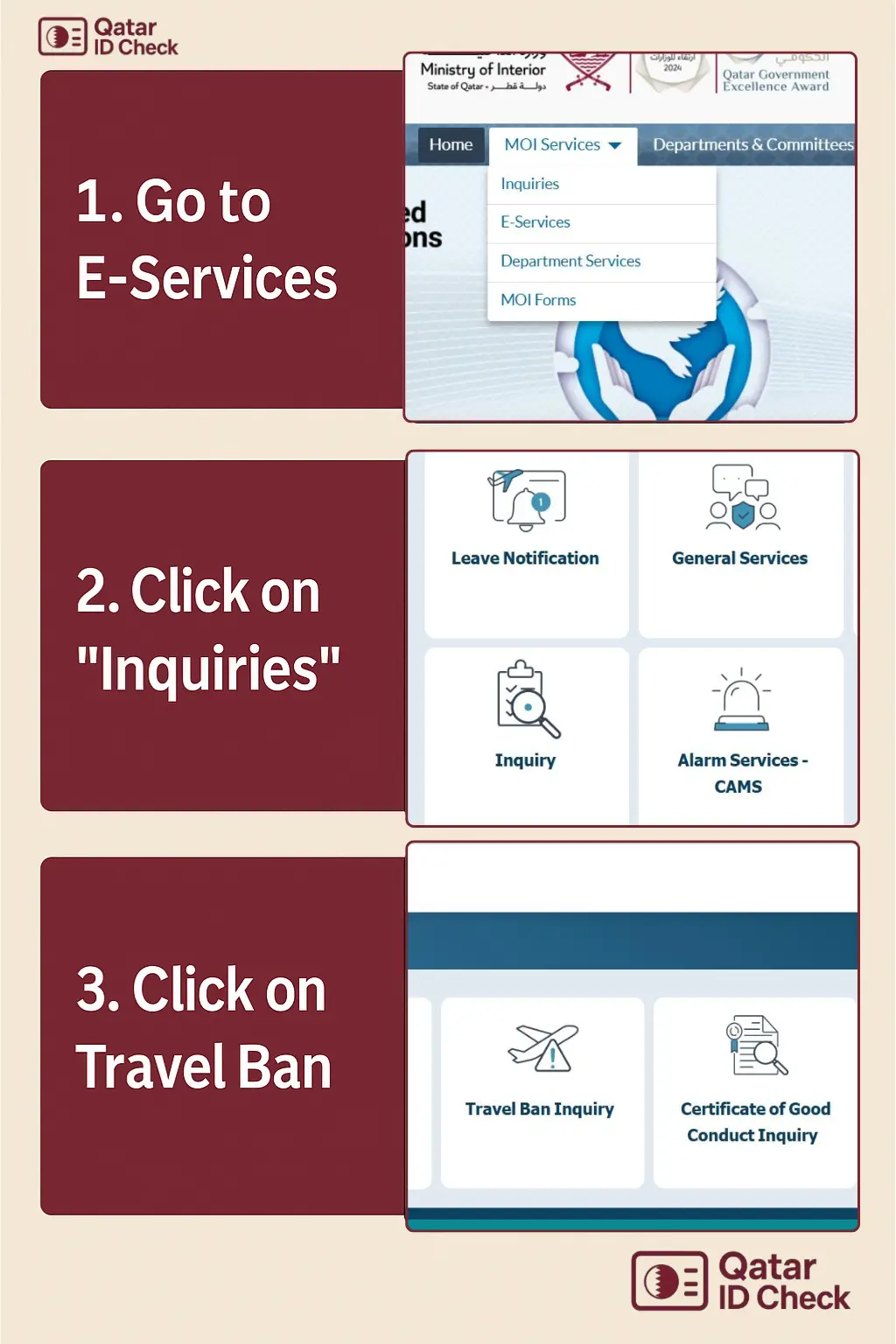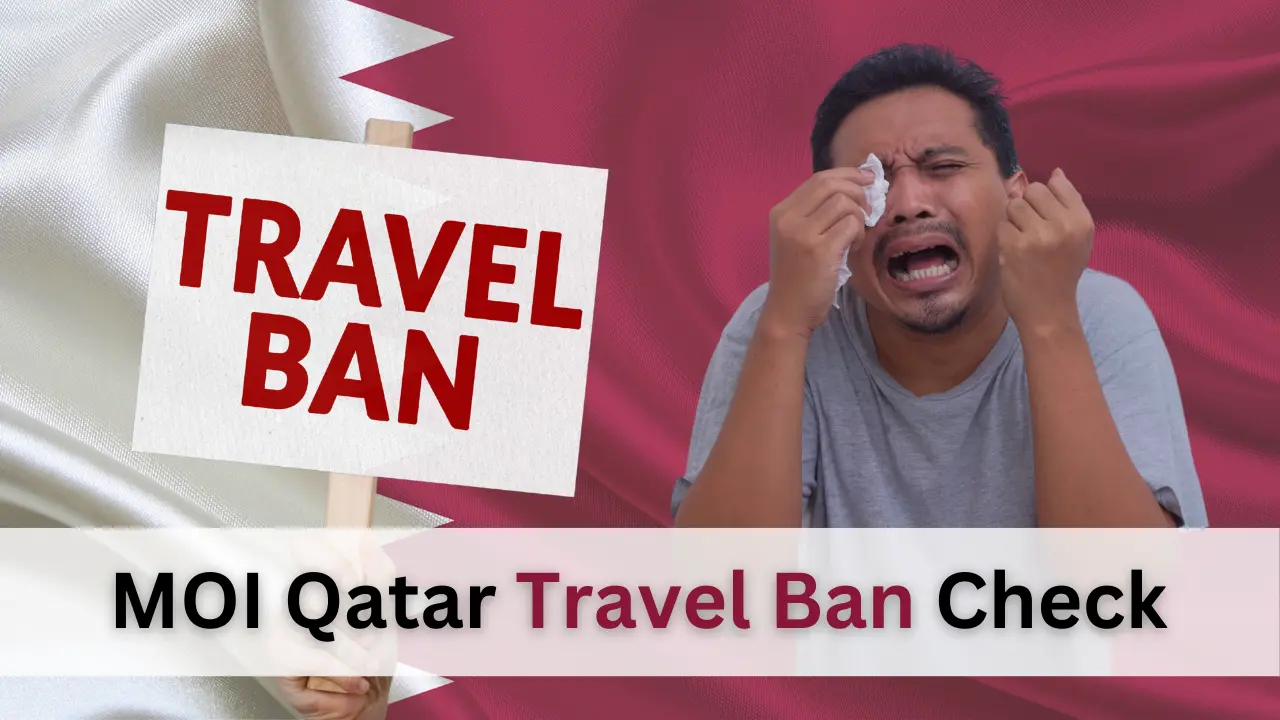How to Check Qatar Travel Ban (QID) — MOI & Metrash
For a fast Qatar travel ban check, open the official MOI e-services or the Metrash app, enter your Qatar ID (QID) and press Search. The result displays whether your QID is blocked, why it was placed, and recommended next steps to resolve it
If you plan to travel to or from Qatar, a quick Qatar travel ban check can help you avoid unexpected issues. You can check your travel ban status online using the Ministry of Interior (MOI) portal or the Metrash app.
Travel bans in Qatar are due to different reasons, such as unresolved legal cases or visa issues. The Qatar travel ban check tool is important so you can take the right steps and solve any problems before they disrupt your travel. You can also use the Qatar ID Status to verify the validity of your QID
Qatar Travel Ban Check Guide: Step-by-Step Process
Quick overview: Use Metrash or MOI to check your QID status; the result shows if you’re blocked and why.
You can check your travel ban status online in 2026 using online and offline methods. Online methods are faster than offline methods. We explain all methods below.
Check Qatar Travel Ban Using the Metrash App
Quick step: Open Metrash → Profile → Travel Ban — the app displays your current ban status and details.
Use the Metrash mobile app for a fast Qatar travel ban check. Log in, select the Travel Ban enquiry under Service Type, and the app will instantly display your current ban status and details.
To check your travel ban status, follow these steps:
- Open the Metrash app and log in using your credentials.
- Tap Service Type under Enquiry Service.
- Choose Travel Ban from the dropdown and tap Continue.
- The app will display your current travel ban status and any related details or instructions.

If you have a travel ban, you will see the details listed on the screen. This may include the type of ban, the date it was placed, and any instructions about next steps.
Qatar Travel Ban Check using the MOI Portal
Quick step: Sign in to MOI e-services → Travel Ban Inquiry → enter QID to view status.
You can use the Ministry of Interior (MOI) Qatar online portal to check the Qatar travel ban. This is one of the quickest and most reliable ways to find out your status before planning to travel.
Follow these steps to check your travel ban:
- Go to the MOI e-services portal.
- Log in using your smart card or create an account if you do not have one.
- Navigate to the “E-Services” section.
- Select “Travel Ban Inquiry” from the list.
- Enter your details as requested.

To access the Qatar travel ban check using the Metrash app or the MOI portal, you’ll need your QID number. If you’re unsure about your ID details or validity, learn how to check your Qatar ID status online.
Contact the Supreme Judiciary Council
Quick step: Call the Council with your QID/passport ready; staff can confirm ban status and next steps.
If you prefer talking directly to someone, you can contact the Supreme Judiciary Council in Qatar. This is a good choice if you want to check or ask about a travel ban on your name or someone else’s.
You can reach the council by calling their phone numbers:
- 5578 8372
- 4459 7769
- 4459 7777
These phone lines are open to both citizens and residents. When you call, have your ID number or passport information ready. This helps staff find your details faster.
If you need more help, you can visit their office in person. Staff there can help with detailed questions or issues you cannot solve online or by phone. Remember to bring your identification documents when visiting or calling for faster service.
How to Check & Remove a Qatar Travel Ban — Video Guide
Watch this short demo showing the Metrash and MOI check methods, why bans occur, and the removal steps — ideal after you review the written steps above.
How To Remove Qatar Travel Ban
Quick fix: Identify the reason, pay fines or provide documents, then submit a removal request to MOI.
If you have a travel ban in Qatar, you must find out the reason for the ban. Common reasons include unpaid debts, court cases, or violations of the law.
1: Check the Reason
Log in to the Ministry of Interior (MOI) e-services portal. Use your smartcard to see details about your ban.
2. Settle Any Issues:
If the ban is due to unpaid fines, pay them. For court cases, you may need to attend hearings or resolve the matter with legal help.
3. Submit a Request:
After resolving the reason for the ban, submit a request for removal through the MOI.
It is sometimes helpful to ask for advice from a legal expert or your embassy, especially if your case is complicated or involves the courts. Legal professionals in Qatar can guide you through the process if needed.
If you cannot resolve the issue online, you may need to visit the MOI office in person. Bring all important documents, such as ID, passport, and any court papers.
Types Of Qatar Travel Ban
Quick fact: Travel bans are legal, financial, immigration, or work-related — each has a different removal path.
There are several types of travel bans in Qatar. These bans can stop you from exiting Qatar or even entering the country.
Legal Travel Bans:
A court may place a legal ban on you if you are involved in criminal cases, police investigations, or ongoing court proceedings. You cannot leave Qatar until the issue is resolved.
Financial Travel Bans:
Unpaid debts, unresolved loans, or bounced cheques are common reasons for financial bans. If you owe money or have financial disputes, you may be blocked from traveling.
Immigration-Related Travel Bans:
If you have violated visa rules or overstayed your visa, immigration authorities might impose a ban. This can prevent you from exiting until you sort out your QID status.
Work-Related Bans:
Your employer can request a travel ban if there are disputes regarding your contract, unpaid salaries, or if you try to resign without following procedures. These issues often involve your sponsor or company.
Here is a simple table showing the main types and reasons:
| Type | Common Reasons |
| Legal: | Court cases, police matters |
| Financial: | Unpaid debts, loan defaults |
| Immigration-Related: | Visa overstay, rule violations |
| Work-Related: | Contract disputes/complaints |
Each type of ban may have its process for removal. It is important to check the Qatar travel ban status before planning to leave Qatar.
Understanding the Travel Ban In Qatar 2026
Quick note: A ban stops travel until the underlying issue is resolved via MOI or courts.
A travel ban in Qatar is a legal order that stops you from leaving or entering the country. This can be placed by government authorities for several reasons. Most often, it is connected to unresolved legal issues or unpaid debts.
If a travel ban is issued, your name will appear on a government list. You may only find out about the ban when you try to travel, or you use the Qatar Travel Ban Check tool in advance.
The travel ban will not end automatically. You must solve the main problem, such as paying debts or resolving court cases, before the ban can be lifted.
You can check your travel ban status online through the Ministry of Interior (MOI) e-services or the Metrash app. This helps you stay informed and avoid unexpected travel issues.
Reasons for Qatar Travel Ban
Quick summary: Common reasons include unpaid fines, court cases, visa violations or employer disputes.
Travel bans in Qatar are usually linked to legal, financial, or immigration issues. They prevent you from leaving the country until the situation is resolved.
Common reasons include:
- Financial disputes: If you have unpaid debts, bounced cheques, or other unresolved financial cases, you may face a travel ban.
- Legal cases: Involvement in ongoing court cases, such as criminal charges or civil lawsuits, can lead to a ban.
- Serious crimes: Being under investigation for serious crimes may automatically restrict you from traveling.
- Immigration issues: Overstaying a visa or being involved in illegal residency cases can result in a travel ban.
Other situations, while less common, can also trigger a ban:
- Violating customs requirements, such as trying to leave with restricted items.
- Delays in child custody or family law disputes.
Here’s a simple table showing these reasons:
| Reason | Example |
| Financial disputes: | Unpaid loan, bounced cheque |
| Legal cases: | Civil or criminal case |
| Serious crimes: | Fraud, theft, assault |
| Immigration issues: | Absconding, Overstaying |
| Customs requirements: | Carrying restricted items |
Importance Of Checking Qatar Travel Ban Status
Quick benefit: Checking early avoids missed flights, fines and legal surprises at the airport.
Making sure there is no travel ban against you in Qatar is important before you plan any international trips. A travel ban can stop you from leaving or entering the country.
Waiting until the last minute to check your status may cause problems at the airport. You could miss your flight or face legal issues.
Key reasons to check your travel ban status:
- Avoid unexpected delays: You can save time and money by knowing your status early.
- Legal safety: Checking helps protect you from legal trouble or fines.
- Peace of mind: You can travel confidently when you know your status is clear.
You can easily check your QID status using Qatar’s Ministry of Interior online portal using your QID number. This process takes only a few minutes and gives you instant results.
It is especially helpful if you have any pending court cases or unpaid fines in Qatar. If a ban is found, you can then take steps to fix the issue before you travel.
Preventing Future Qatar Travel Ban
Quick tip: Keep QID documents current and pay fines promptly to avoid future exit blocks.
To avoid facing a travel ban in Qatar, it is important to stay informed and up-to-date with all legal and financial responsibilities.
Always pay your fines, loans, and debts on time. Unpaid bills or court fines can quickly lead to a travel ban. Keep your residency and visa documents valid. Double-check expiration dates and renew your permits early.
Useful Tips:
- Check for any legal cases or complaints with your name.
- Avoid breaking traffic or immigration laws.
- Cooperate with authorities if contacted about any issues.
| Action | Why It Matters |
| Pay dues on time: | Prevents legal action |
| Update documents: | Avoids permit violations |
| Follow the law: | Stops the ban triggers |
Using apps like Metrash or the Ministry of Interior (MOI) portal helps you keep track of your legal standing.
Impact Of Travel Ban On VISA Types
Quick summary: Travel bans affect tourists and residents differently – always verify by visa type before travel.
A travel ban in Qatar can affect people with different visa types in different ways. If you have a tourist visa, you may not be able to enter Doha. Even if you already have a ticket with Qatar Airways, a travel ban will stop you from boarding your flight.
People with residence visas might not be able to leave or enter the country if they are affected by a travel ban. This can disrupt your daily life and even work. You may also have issues with renewing your visa or getting permits for your family.
Entry requirements may change quickly. It is important to use the Qatar travel ban check tool before booking your flight or making plans. Qatar Airways and airport authorities will not let passengers board if their names are under a travel ban.
Frequently Asked Questions
Related Article:
Conclusion
Checking your travel ban status in Qatar is a simple process if you know where to look. Use the Ministry of Interior Portal or the Metrash App. Always use Qatar travel ban check tool before buying a ticket or planning a trip. If you have a pending civil or criminal case, you may have a travel ban until it is resolved. Contact the MOI service centers and resolve the reasons for the Qatar travel ban.

